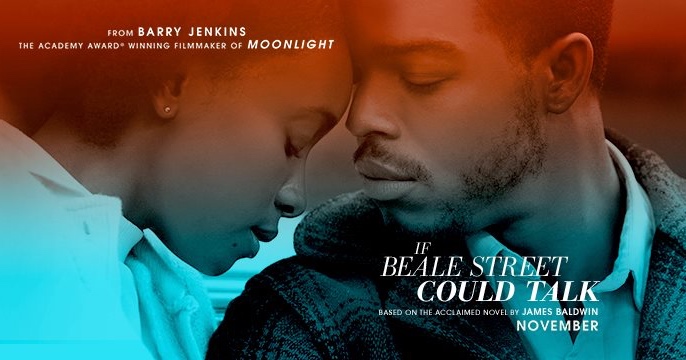Susan Granger’s review of “If Beale Street Could Talk” (Annapurna Pictures)
Following his Oscar-winning “Moonlight,” Barry Jenkins continues his cinematic exploration of the Afro-American experience in 20th century America with this adaptation of James Baldwin’s critically acclaimed 1974 novel. The symbolic title references the 1916 W.C. Handy song “Beale Street Blues.”
In 1970s Harlem, a naïve 19 year-old woman discovers she’s pregnant with her 22 year-old boyfriend’s baby after he’s been framed by a racist cop with a grudge against him and arrested for a rape he didn’t commit.
Tish (KiKi Layne) and Alfonso, known as Fonny (Stephan James), are tender soul-mates, totally committed to one another. Yet, except for their families, the rest of the world seems stacked against them.
Tish’s hard-working parents (Colman Domingo, Regina King) are totally supportive, but Fonny’s hot-tempered father (Michael Beach) hauls off and hits his sassy, judgmental mother (Aunjanue Ellis).
Later, Tish’s bitterly determined mother travels to Puerto Rico to confront the woman (Emily Rios) who mistakenly identified Fonny in a police line-up.
Barry Jenkins took a real gamble, writing the screenplay before receiving approval from James Baldwin’s estate, then casting newcomer KiKi Layne, a graduate of The Theater School at DePaul University, and Canadian actor Stephan James, who played Jesse Owens in “Race” (2016).
Undoubtedly, the racism/injustice that this young couple faces resonates today. “You look at Fonny, and you look at issues of mass incarceration and false imprisonment in this country,” James says. “A lot of my performance takes place behind prison glass, and that adds a whole element and makes it real.”
“It makes you question just what has to happen for progress,” Layne adds.
Although vividly rendered by cinematographer James Laxton, Jenkins’ choice of episodic, nonlinear flashbacks is occasionally confusing, while Brian Tyree Henry’s cameo as Fonny’s childhood friend Daniel, who was also falsely imprisoned, adds depth.
“The white man has got to be the devil,” he says, “because he sure ain’t a man.”
On the Granger Movie Gauge of 1 to 10, “If Beale Street Could Talk” is an anguished 7, augmented by Nicolas Britell’s synergetic score.

